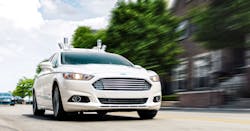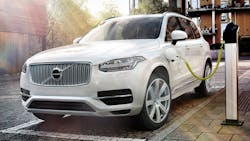The world of self-driving cars is becoming more and more a reality with every passing day. Major players in the automotive world are taking notice of what software companies have been working on for the past few years. Autonomous driving technology powered by sensors and artificial intelligence (AI) has been spearheaded by companies like Google, Local Motors, Uber, and Tesla. In recent years, major car manufacturers like Audi and Volvo have developed self-driving car technology and test cities to help develop their technology. Now Ford Motors is also growing its reach into this market.
In June, Ford announced its plans to develop an artificial intelligence division. Vice President of Research & Engineering and Chief Technical Officer Ken Washington announced the creation of the Robotics and Artificial Intelligence Research team as part of Ford’s Research and Advanced Engineering Department. According to Washington, “This team will be dedicated to a greater focus on evaluating new sensor technologies, machine learning methods, technical requirements for entry into global markets, and development of personal mobility devices, drones and other aerial robotics to enhance first- and last-mile travel.”
Testing of the artificial intelligence cars will continue to happen at Mcity, the Ford urban environment testing track at the University of Michigan.
This effort is guided from the partnership formed back in February this past year with Argo AI, an artificial intelligence company based in Pittsburgh. Argo AI’s main goal is to develop the virtual driver system, which includes the computer platform, sensors, and algorithms. Ford will be combining its existing virtual driver system with the driver system advances developed by Argo AI. The technology was recently demonstrated at Mcity, the test track at the University of Michigan. The track simulates an urban environment with traffic lights, pedestrians, and other moving vehicles. The production date previously set by Ford will go unaffected and the new partnership with Argo AI will help push Ford to meet its time schedule release of 2021.
The development of AI cars is nothing new. Car manufacturers like Volvo, Toyota, Tesla, and Honda have all developed design departments around the development of self-driving cars. A recent market report from Research and Markets projects that the autonomous vehicle market will be a $126.8 billion industry by 2027. The report indicates the strong trend of car manufacturers developing driverless vehicles with systems built in-house. Along with Ford, the key players reported to factor into this market are companies like Apple, Google, Nissan Motor, Intel, Volvo, General Motors, Argus Cyber Security, nuTonomy, Almotive, and Autoliv.
Volvo will continue to ramp up their electric vehicle production as a way of offsetting their financial losses due to the decreases of purchases in diesel vehicles.
Key factors driving the market growth will be the increased investments by automakers, customers needs and driving behaviors, and environmental friendly features. The environmental factor will play a key role in the development of these technology. As reported by Automotive News, Volvo announced that it would only produce electric or hybrid cars by 2019. The reason behind this move is due to the repercussions of Dieselgate, the diesel efficiency reports from Volkswagen. The diesel market is no longer a production option for many car companies as many consumers have left that market due to the scandal. Volvo, like other car manufacturers looking to maintain their efficiency goals, will now look to electric vehicles to help fill that gap.
About the Author
Carlos Gonzalez
Content DIrector
Carlos M. Gonzalez joined Penton Media Group in 2015. He achieved a B.S. mechanical engineering at Manhattan College and a M.S. in mechanical engineering at Columbia University. Prior to working for Penton Media, Carlos worked at Sikorsky Aircraft in their Hydraulics and Mechanical Flight Controls department; working on their S76D commercial and the Navy’s CH-53K aircraft programs.


